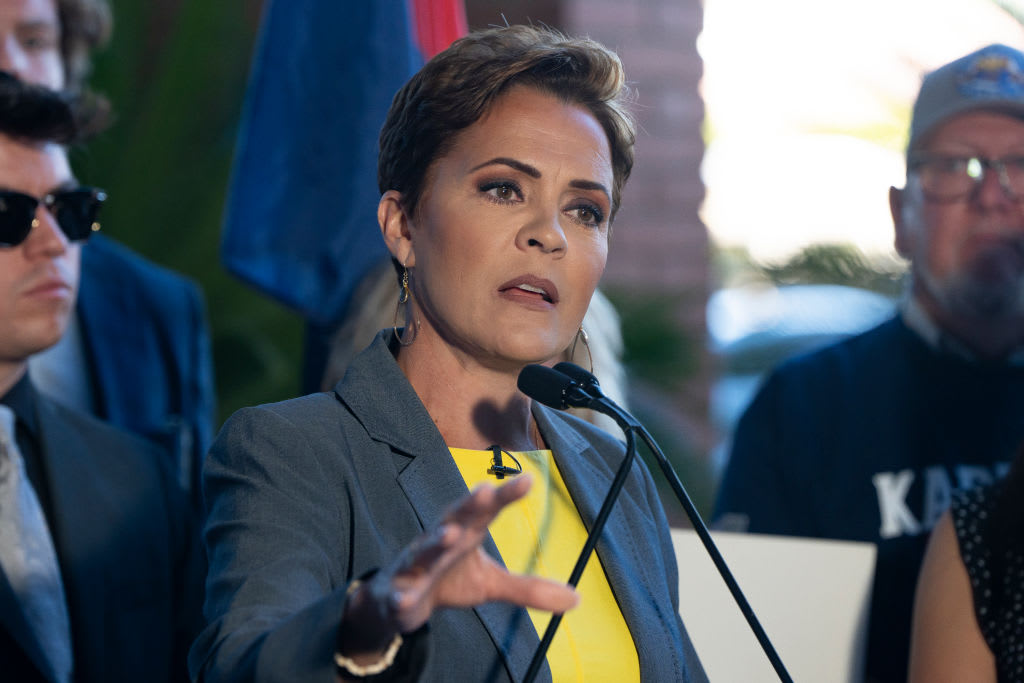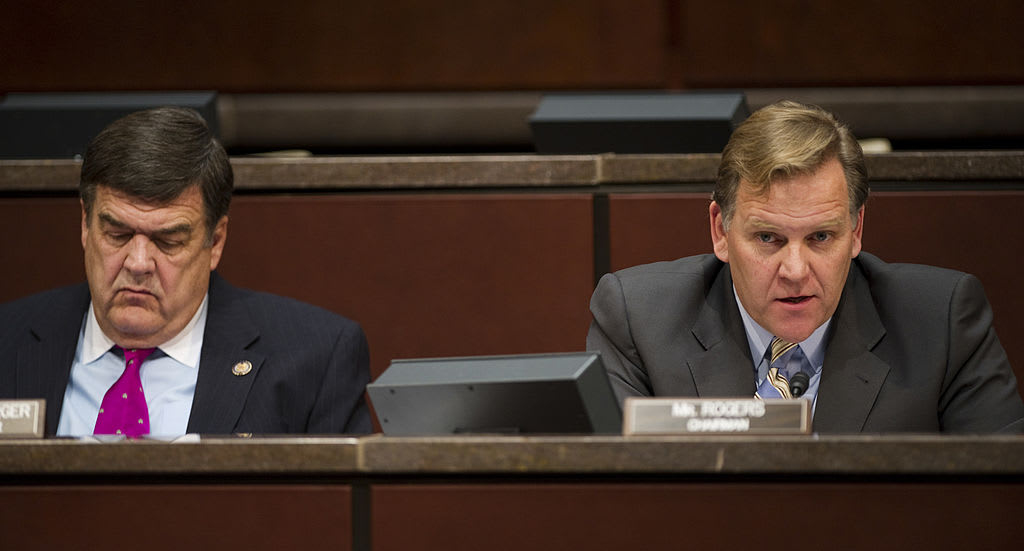Welcome to Trail Mix, your 2024 election sanity guide. See something interesting on the trail? Email me at jake.lahut@thedailybeast.com. To get Trail Mix in your inbox, subscribe here for free.
This week, we find some surprising praise—along with some hefty demands—for President Biden from the progressive, pro-Palestinian base. Plus, Trump’s attempts to address the GOP’s big abortion problem, and drama out of the Michigan Senate race.
UN-UNCOMMITTED?
After six months of brutal war in Gaza—and six months of stateside organizing, outrage, and protest ballots from American progressives—an opportunity may finally be emerging for President Joe Biden to win back the potential votes he lost over his support of Israel.
Even the president’s biggest pro-Palestine critics are acknowledging he is improving his standing among those who threatened to withhold their votes for him in the November rematch with Donald Trump. They’re pointing to Biden’s advocacy for an immediate temporary ceasefire and his increasingly harsh criticism of Israeli Prime Minister Benjamin Netanyahu as signs he is listening.
Layla Elabed, a Palestinian-American activist in Michigan who has been one of the most prominent voices warning Biden and Democrats about the domestic political ramifications of the Gaza war, said the past week has her feeling more encouraged than at any point previously in the conflict.
“We have seen a shift in language, a shift in the Biden administration and with Biden himself in the way that they’ve talked about their policy around what’s happening in Gaza and how Israel is handling this,” Elabed told The Daily Beast. “We definitely saw a shift in narrative and a shift in language.”
Others on the left are sensing a shift in Biden, too, and are crediting the movement’s persistent organizing.
Beth Miller, the political director of Jewish Voice for Peace, a Jewish anti-Zionist organization, told The Daily Beast the “grassroots pressure has been working.”
Biden calling for a ceasefire was “an incredibly important move,” said Miller, who said she was speaking in her personal capacity and not on behalf of Jewish Voice for Peace.
It’s unclear, of course, exactly how many frustrated progressives have been moved by Biden’s dialed-up criticism of Israel. But persuading even some of them could make a huge electoral difference in November.
Elabed—the younger sister of Rep. Rashida Tlaib (D-MI), Congress’s only Palestinian-American member—was a lead organizer of the “Listen to Michigan” campaign, which galvanized over 100,000 Democrats to cast an “uncommitted” ballot in the state’s presidential primary in February.

Attendees listen to speeches during an “Uncommitted for Joe Biden” primary election night watch party on February 27, 2024 in Dearborn, Michigan.
Kevin Dietsch/Getty Images
In 2020, Biden won Michigan by 154,000 votes. In other states with substantial pro-Palestinian activist forces, the margin was even narrower—like Pennsylvania, where Biden won by 81,000 votes in 2020.
Both states will be critical to Democrats’ hopes of defeating Trump. Indeed, Elabed said the goal of the Listen to Michigan campaign was not to deal Biden a serious blow but help him “save his presidency” by shifting his approach to the Gaza war.
While activists welcome the change in Biden’s tone, they insist that the president can only shore up his coalition by delivering substantive policy changes—like conditioning U.S. military aid to Israel on concessions from Netanyahu to significantly curtail or end his offensive.
“There is a depth of anger with the progressive electorate around this issue where a rhetorical shift alone will not be enough to get these voters back,” said Joseph Geevarghese, the executive director of Our Revolution, the progressive group that emerged from Sen. Bernie Sanders’ 2016 campaign.
Geevarghese said Biden needs to use the power of the purse to win these voters back. That’s where conditional aid comes in. “Base voters who care about this issue want to see the U.S. government use its leverage, not just the bully pulpit—and the leverage here is financial,” he told The Daily Beast.
Even then, the biggest danger for Biden still looms: that his six months of generally backing Israel during its bombing campaign, which Gaza health officials say has left over 30,000 Palestinians dead, have ensured that some progressives simply can never stomach voting for him again.
“For some voters, they’re going to have to vote their conscience,” Elabed said. “And it will be hard to vote for a president who we’ve been begging since October to change policy and change course.”
Biden allies recognize the threat.
“There are gonna be some people who just aren’t gonna show up,” Minnesota Attorney General Keith Ellison, a progressive Biden supporter who’s been a critic of the Israeli government, told The Daily Beast.
Ellison, the first ever Muslim elected to Congress, said the issue is deeply personal for some voters, especially those who’ve lost family members to the war. However, he insisted the party can make it up by turning out low-propensity voters who don’t always show up.
“There’s enough occasional voters to make up the difference,” Ellison said, citing the cities of Flint and Detroit as two prime examples where the Democrats could boost turnout in Michigan. “And by the way, I think that this debate the uncommitteds are driving is healthy, we do need to discuss this issue. So I don’t begrudge those folks at all.”
Indeed, many Democrats hope the organizing will end up improving Biden’s chances at re-election, not hurting them.
“When you look at the uncommitted movement and the folks who are involved in organizing there,” Rich Luchette, a longtime Democratic strategist, told The Daily Beast, “they’ve been very careful in their messaging that this is part of an effort to push the administration’s foreign policy and not necessarily to topple the president as the Democratic nominee, or to move third party, or to even vote for Trump.”
The Biden campaign welcomed the debate in a statement affirming the president’s desire to bring the bloodshed to an end.
“The President believes making your voice heard and participating in our democracy is fundamental to who we are as Americans,” campaign spokesperson Charles Lutvak told The Daily Beast in an email. “He shares the goal for an end to the violence and a just, lasting peace in the Middle East. He’s working tirelessly to that end.”
Democrats may also be hoping that Trump’s own remarks on the war will sharpen the contrast and ultimately galvanize pro-Palestine voters to show up for Biden. The former president has been far more hawkish on Israel and has repeatedly talked about civilian deaths as being more of an optics issue than a human rights concern.
“Overwhelmingly, what most folks are saying in those spaces is they’re terrified of a Trump administration,” said Miller, the anti-Zionist activist.
As she keeps up the pressure on Biden to bring about an end to the war, however, Elabed yet again spelled out the same consequences the president has been facing for six months.
Unless the president continues to shift in rhetoric and policy, she said, “he’s putting Benjamin Netanyahu ahead of his own re-election.”
FOLLOW THE LEADER
Donald Trump’s vague announcement earlier this week that he would leave abortion decisions to states—with the obvious implication being that he wouldn’t sign a national abortion ban—managed to piss off both Democrats and Republicans.
Democrats predictably blasted Trump for letting state lawmakers undermine abortion protections, while also noting the former president’s hypocrisy. And for conservatives, Trump’s decision to play politics with an issue they believe is as clear as life and death left them “deeply disappointed.”
But according to several Republicans tasked with winning down-ballot races in November—especially House and Senate races—Trump’s statement was a salvation.
The thinking is Trump’s position, no matter how transparently political the announcement, gives House and Senate candidates a chance to follow his lead, downplay the threat that Republicans and Trump pose to abortion access, and unite with the party’s standard bearer—all while trying to undermine one of the most potent attacks Democrats have this year.
“It took the threat of a national abortion ban off the table,” said a top Republican operative, “because Trump is saying he doesn’t want it.”
“This really kind of kneecaps that argument,” the operative continued, adding that now Republicans “are going to have to go fight back” against Democratic attacks and “make clear what their current position is on this issue.”
That kind of focused attention would be a departure from the party’s strategy in 2022, when, the operative said, Republicans “buried our heads in the sand” on abortion.
While GOP operatives thought this was a crucial step for Republican candidates, it may not be so easy.
Trump paved the way for the current state of abortion laws in the country, something he has proudly and repeatedly touted for years. In the days after his call to leave the issue to the states, a court in Arizona upheld an 1864 law that almost entirely bans abortion in the key battleground state, citing the Supreme Court’s 2022 Dobbs decision repeatedly in their order.
While Trump and other Republicans quickly said the court went too far, the Arizona decision highlights what leaving it to states looks like for Trump—which may prove to be a key motivator for Democrats in November.
But the calculus may be different down ballot, these Republican operatives said.
“It’s a huge net benefit for us,” another top Republican operative working on House races told the Daily Beast. “The House is going to be won or lost in New York and California, all states where very liberal abortion laws are enriched in the state’s constitutions. So this weakens any line of attack from Democrats on our guys.”
Of course, Democrats aren’t having any of that. The party has roundly tied Trump to the decision in Arizona, Biden’s campaign released an ad on Thursday where the President says “women’s lives are in danger” because of Trump, and Democrats in key House and Senate races have long signaled the plan to make abortion a central issue in November.
For months, Republican operatives advising House and Senate candidates have been urging candidates to oppose a national abortion ban and support exceptions, like in cases of rape, incest, and when the life of the mother is threatened. All of those positions are backed up by internal GOP polling.
“We have to make sure our position is well-known and we have to talk about it constantly. Because if we don’t, we allow the Democrats to define it for us,” said a top Republican operative working on House races.
Easier said than done. Many of the party’s top candidates have taken conservative abortion positions for years, meaning any shift to keep up with the changing politics on the issue will not only look politically motivated but could open them up to charges of hypocrisy from the right.

Arizona Republican U.S. Senate candidate Kari Lake at a news conference on February 29, 2024 in Phoenix, Arizona.
Rebecca Noble/Getty Images
Take Republican Senate candidate Kari Lake in Arizona. The Trump ally and election denier quickly called the Arizona court’s decision “out of step with Arizonans” and urged her state’s lawmakers to roll back the court’s decision with legislation. And she put out a video on Thursday that echoed Trump’s position on the issue.
And yet, two years earlier, Lake was so familiar with the 160-year-old law that she brought it up by its number—ARS 13-3603—telling conservative James T. Harris that she was “incredibly thrilled” with what she called a “great law.”
NOT A BEAUTIFUL DAY IN THE NEIGHBORHOOD
When he nabbed a Trump endorsement a month ago, Mike Rogers declared he had all but locked up the GOP nomination for U.S. Senate in Michigan.
“This thing is done,” Rogers said on a podcast shortly after receiving the most coveted MAGA prize. His polling in the Republican primary went up 40 points practically overnight.
The reaction since then, however, suggests the primary is hardly done. The former congressman has been taking heat from across the GOP spectrum, from the MAGA wing to those who oppose Trump.
Rogers, who briefly flirted with a 2024 presidential run against Trump, built his career in Congress as a bipartisan dealmaker. He also said “Trump’s time has passed” in 2022 and has called the former president’s tactics “clearly destructive.”
A Reagan-era Republican who left Congress months before Trump launched his 2016 campaign, Rogers is an odd fit with a GOP base that craves extreme rhetoric and a fire-and-brimstone vibe from its candidates.
Indeed, last month, 25 of Michigan’s 60 delegates to the Republican National Convention called on Trump to un-endorse Rogers in favor of a “strong conservative.”
It wouldn’t be the first time a state GOP reshaped in Trump’s image has turned on a Trump pick—and it also wouldn’t be the first time Trump has retracted his “complete and total endorsement.”

Michigan Senate candidate Mike Rogers during a congressional hearing when he served as chairman of the House Intelligence Committee.
Scott J. FerrellCongressional Quarterly/Getty Images
Not only are Republican hardliners going after Rogers for appearing too moderate, but one of the state’s most prominent Never Trumpers is also putting his feet to the fire—and running against him in the primary.
Former Rep. Justin Amash (I-MI), who left the GOP after calling to impeach Trump in 2019, said Rogers “might have the worst record of anyone I served with in Congress” in a March 11 tweet.
At the core of Amash’s case is outrage over Rogers’ tenure as chairman of the House Intelligence Committee—which, ironically, may resonate with a MAGA faction that is deeply suspicious of the “Deep State.”
Amash went after Rogers as having “repeatedly weaponized the government against Americans” as “the chief advocate of warrantless surveillance programs like FISA 702,” a statute that has authorized wiretapping of foreigners by U.S. intelligence agencies.
All of this infighting is music to the ears of Michigan Democrats, who are gearing up for one of the nation’s most competitive and expensive Senate races. Their likely candidate is Rep. Elissa Slotkin (D-MI), who is favored in her primary against actor Hill Harper.
“Michigan Republicans’ chaotic, bruising intra-party fight is getting even nastier as Revolving Door Rogers faces attacks on his record of enriching himself at Michiganders’ expense,” Sam Chan, a spokesperson at Michigan Democratic Party told The Daily Beast. “The brutal infighting in the Republican Senate primary will leave them with a damaged nominee who is out-of-step with Michiganders.”
POLLING STATION
Robert F. Kennedy, Jr., is the first to say it.
“The only group that I don’t do well in are baby boomers,” Kennedy said at a town hall event with Patrick Bet-David, an entrepreneur and conservative YouTuber.
Even though one might assume that the Kennedy family name would resonate more with voters who recall the family’s heyday, baby boomers are indeed the age demographic least supportive of his independent presidential bid.
Kennedy’s theory of the case is simply that the boomers watch too much TV, saying at the same event “if that was the news bubble that I was living in, I’d have a very low opinion of myself as well.”
Polling shows he’s not completely off base, but the picture is more complicated than that. The more common denominator among baby boomers isn’t TV, but simply that they’ve been paying closer attention to the 2024 campaign than everybody else.
As former pollster Adam Carlson pointed out in a thread on X, Kennedy keeps doing worse month over month among voters older than 65 in national polls, on average. YouGov/Economist polling from February also shows those same voters are paying attention far more than their generational cohorts, with more than half actively tuning into the campaign.
The only group which came close to the 54 percent of voters over 65 who said they’re paying “a lot” of attention to the 2024 campaign were those between 45 and 64 years old at just 43 percent, with an even steeper drop-off among Gen Z and Millennials.
CAMPAIGN LIT
Debate club. Trump’s campaign officially wants to debate Biden earlier and more often, Reese Gorman reports.
Cruz control. Sen. Ted Cruz’s super PAC is pocketing the cash from his lucrative podcasting deal in an arrangement that raises campaign finance red flags, Roger Sollenberger and Mini Racker report.
Art of the deal. Trump’s much-hyped statement on abortion pissed off the religious right—which may have been the point, Reese and Jake Lahut write.
Retirement rage. This year’s exodus of lawmakers retiring from a broken Congress is spawning a number of nasty fights in the open primaries to anoint their successors, Riley Rogerson reports.
States of play. The Democratic Party’s official arm for state legislature races pulled in a record campaign cash haul in the first three months of 2024, but they still need more cash to flip key chambers nationally, Mini reports.
